Vanja Dukic
Weak Form Learning for Mean-Field Partial Differential Equations: an Application to Insect Movement
Oct 09, 2025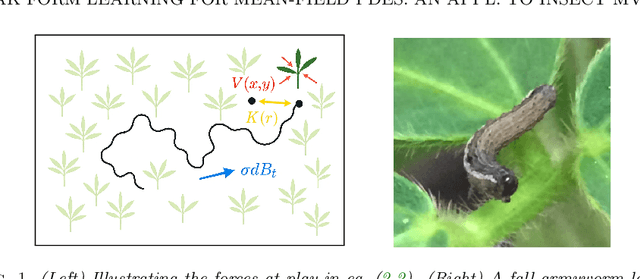
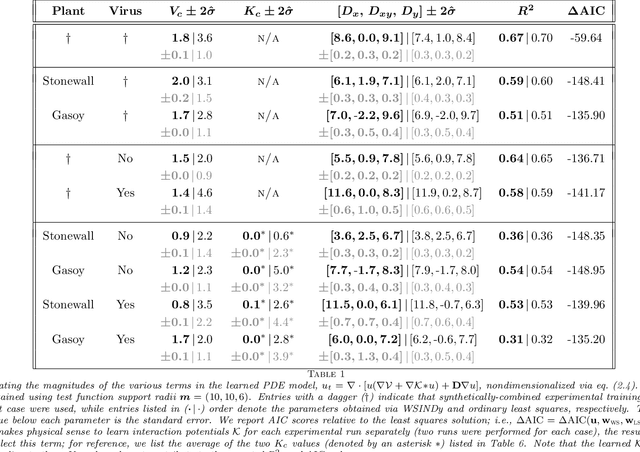
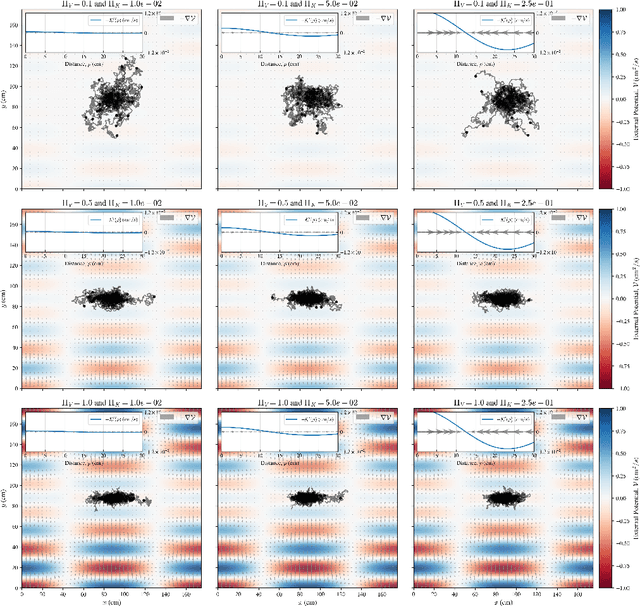
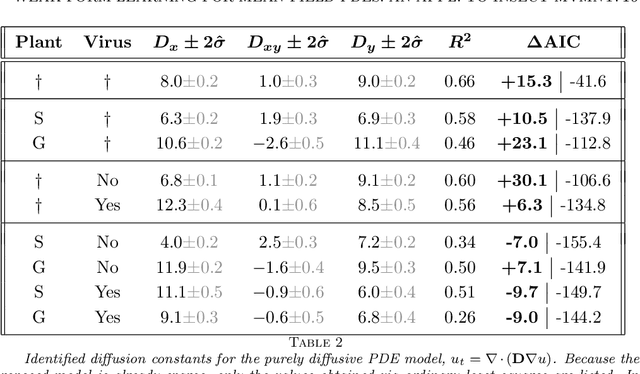
Abstract:Insect species subject to infection, predation, and anisotropic environmental conditions may exhibit preferential movement patterns. Given the innate stochasticity of exogenous factors driving these patterns over short timescales, individual insect trajectories typically obey overdamped stochastic dynamics. In practice, data-driven modeling approaches designed to learn the underlying Fokker-Planck equations from observed insect distributions serve as ideal tools for understanding and predicting such behavior. Understanding dispersal dynamics of crop and silvicultural pests can lead to a better forecasting of outbreak intensity and location, which can result in better pest management. In this work, we extend weak-form equation learning techniques, coupled with kernel density estimation, to learn effective models for lepidopteran larval population movement from highly sparse experimental data. Galerkin methods such as the Weak form Sparse Identification of Nonlinear Dynamics (WSINDy) algorithm have recently proven useful for learning governing equations in several scientific contexts. We demonstrate the utility of the method on a sparse dataset of position measurements of fall armyworms (Spodoptera frugiperda) obtained in simulated agricultural conditions with varied plant resources and infection status.
WENDy for Nonlinear-in-Parameter ODEs
Feb 13, 2025Abstract:The Weak-form Estimation of Non-linear Dynamics (WENDy) algorithm is extended to accommodate systems of ordinary differential equations that are nonlinear-in-parameters (NiP). The extension rests on derived analytic expressions for a likelihood function, its gradient and its Hessian matrix. WENDy makes use of these to approximate a maximum likelihood estimator based on optimization routines suited for non-convex optimization problems. The resulting parameter estimation algorithm has better accuracy, a substantially larger domain of convergence, and is often orders of magnitude faster than the conventional output error least squares method (based on forward solvers). The WENDy.jl algorithm is efficiently implemented in Julia. We demonstrate the algorithm's ability to accommodate the weak form optimization for both additive normal and multiplicative log-normal noise, and present results on a suite of benchmark systems of ordinary differential equations. In order to demonstrate the practical benefits of our approach, we present extensive comparisons between our method and output error methods in terms of accuracy, precision, bias, and coverage.
Learning Weather Models from Data with WSINDy
Jan 01, 2025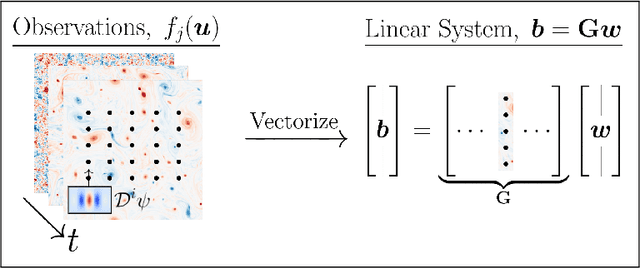
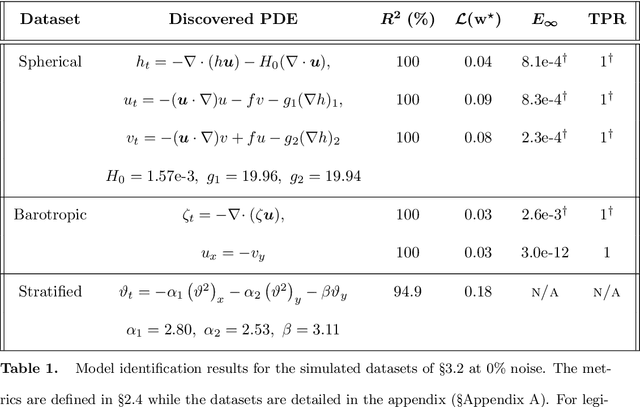

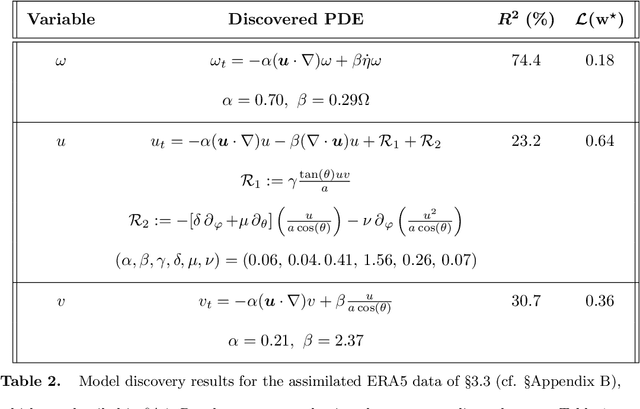
Abstract:The multiscale and turbulent nature of Earth's atmosphere has historically rendered accurate weather modeling a hard problem. Recently, there has been an explosion of interest surrounding data-driven approaches to weather modeling, which in many cases show improved forecasting accuracy and computational efficiency when compared to traditional methods. However, many of the current data-driven approaches employ highly parameterized neural networks, often resulting in uninterpretable models and limited gains in scientific understanding. In this work, we address the interpretability problem by explicitly discovering partial differential equations governing various weather phenomena, identifying symbolic mathematical models with direct physical interpretations. The purpose of this paper is to demonstrate that, in particular, the Weak form Sparse Identification of Nonlinear Dynamics (WSINDy) algorithm can learn effective weather models from both simulated and assimilated data. Our approach adapts the standard WSINDy algorithm to work with high-dimensional fluid data of arbitrary spatial dimension. Moreover, we develop an approach for handling terms that are not integrable-by-parts, such as advection operators.
The Weak Form Is Stronger Than You Think
Sep 10, 2024


Abstract:The weak form is a ubiquitous, well-studied, and widely-utilized mathematical tool in modern computational and applied mathematics. In this work we provide a survey of both the history and recent developments for several fields in which the weak form can play a critical role. In particular, we highlight several recent advances in weak form versions of equation learning, parameter estimation, and coarse graining, which offer surprising noise robustness, accuracy, and computational efficiency. We note that this manuscript is a companion piece to our October 2024 SIAM News article of the same name. Here we provide more detailed explanations of mathematical developments as well as a more complete list of references. Lastly, we note that the software with which to reproduce the results in this manuscript is also available on our group's GitHub website https://github.com/MathBioCU .
Weak-Form Inference for Hybrid Dynamical Systems in Ecology
May 31, 2024



Abstract:Species subject to predation and environmental threats commonly exhibit variable periods of population boom and bust over long timescales. Understanding and predicting such behavior, especially given the inherent heterogeneity and stochasticity of exogenous driving factors over short timescales, is an ongoing challenge. A modeling paradigm gaining popularity in the ecological sciences for such multi-scale effects is to couple short-term continuous dynamics to long-term discrete updates. We develop a data-driven method utilizing weak-form equation learning to extract such hybrid governing equations for population dynamics and to estimate the requisite parameters using sparse intermittent measurements of the discrete and continuous variables. The method produces a set of short-term continuous dynamical system equations parametrized by long-term variables, and long-term discrete equations parametrized by short-term variables, allowing direct assessment of interdependencies between the two time scales. We demonstrate the utility of the method on a variety of ecological scenarios and provide extensive tests using models previously derived for epizootics experienced by the North American spongy moth (Lymantria dispar dispar).
Direct Estimation of Parameters in ODE Models Using WENDy: Weak-form Estimation of Nonlinear Dynamics
Feb 28, 2023Abstract:We introduce the Weak-form Estimation of Nonlinear Dynamics (WENDy) method for estimating model parameters for non-linear systems of ODEs. The core mathematical idea involves an efficient conversion of the strong form representation of a model to its weak form, and then solving a regression problem to perform parameter inference. The core statistical idea rests on the Errors-In-Variables framework, which necessitates the use of the iteratively reweighted least squares algorithm. Further improvements are obtained by using orthonormal test functions, created from a set of $C^{\infty}$ bump functions of varying support sizes. We demonstrate that WENDy is a highly robust and efficient method for parameter inference in differential equations. Without relying on any numerical differential equation solvers, WENDy computes accurate estimates and is robust to large (biologically relevant) levels of measurement noise. For low dimensional systems with modest amounts of data, WENDy is competitive with conventional forward solver-based nonlinear least squares methods in terms of speed and accuracy. For both higher dimensional systems and stiff systems, WENDy is typically both faster (often by orders of magnitude) and more accurate than forward solver-based approaches. We illustrate the method and its performance in some common population and neuroscience models, including logistic growth, Lotka-Volterra, FitzHugh-Nagumo, Hindmarsh-Rose, and a Protein Transduction Benchmark model. Software and code for reproducing the examples is available at (https://github.com/MathBioCU/WENDy).
 Add to Chrome
Add to Chrome Add to Firefox
Add to Firefox Add to Edge
Add to Edge